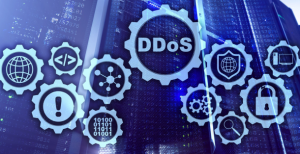This Industry Viewpoint was authored by Donny Chong, Product & Marketing Director, Nexusguard
 Distributed Denial of Service (DDoS) attacks pose a significant threat to the digital landscape, causing major disruptions across various sectors. Internet Service Providers (ISPs) play a crucial role in maintaining a stable and secure internet ecosystem but often bear the brunt of DDoS attacks, resulting in significant downtime for their customers. This article explores the reasons why DDoS attacks on ISPs cause major downtime and discusses the important role ISPs should play in combating these attacks. Furthermore, it presents arguments for and against ISP responsibility in mitigating DDoS attacks.
Distributed Denial of Service (DDoS) attacks pose a significant threat to the digital landscape, causing major disruptions across various sectors. Internet Service Providers (ISPs) play a crucial role in maintaining a stable and secure internet ecosystem but often bear the brunt of DDoS attacks, resulting in significant downtime for their customers. This article explores the reasons why DDoS attacks on ISPs cause major downtime and discusses the important role ISPs should play in combating these attacks. Furthermore, it presents arguments for and against ISP responsibility in mitigating DDoS attacks.
Why DDoS Attacks to ISPs Cause Major Downtime for Customers
When an ISP falls victim to a DDoS attack, the consequences can be severe for its customers. These attacks flood the ISP’s network infrastructure with malicious traffic, leading to congestion, outages, and disruptions. The following factors contribute to downtime:
- Congestion and network saturation: DDoS attack traffic overwhelms the ISP’s network infrastructure, saturating available bandwidth and causing packet loss, delays, and dropped connections for customers.
- Routing instability: Attack traffic disrupts the ISP’s routing infrastructure, overwhelming routers and leading to unreliable or unavailable network routes, further impacting customer connectivity.
- Service disruptions: DDoS attacks result in slow internet speeds, inability to access websites or online services, and loss of connectivity, varying in severity and duration based on the scale and type of attack.
- Collateral damage: Attacks on ISPs can cause collateral damage to other networks and services reliant on their infrastructure, amplifying the impact and resulting in more widespread outages for customers.
The Role of ISPs in Combating DDoS Attacks
Given their critical role in providing internet connectivity, ISPs should actively combat DDoS attacks. Key roles ISPs should play include:
- Investing in robust DDoS mitigation strategies: ISPs need to allocate resources for implementing advanced detection and mitigation tools capable of identifying and blocking malicious traffic in real-time.
- Collaborating with specialized security organizations: Establishing partnerships and collaborations with security organizations enhances the ability to detect and mitigate DDoS attacks effectively through information and resource sharing.
- Building network capacity: ISPs must ensure sufficient network capacity to handle large-scale DDoS attacks, investing in scalable infrastructure to absorb attack traffic without significant disruptions to customers.
- Developing effective incident response plans: ISPs should have well-defined incident response plans in place, outlining steps to be taken during an attack, including customer communication, activation of mitigation measures, and prompt service restoration.
Arguments for ISP Responsibility
Several arguments support ISP responsibility in combating DDoS attacks:
- Infrastructure Control: ISPs have control over network infrastructure, enabling them to monitor and identify abnormal traffic patterns indicative of DDoS attacks. Taking responsibility for detecting and mitigating these attacks protects customers and maintains a reliable and secure network.
- Customer Trust and Reputation: ISPs act as gateways to the interne0t, and by actively combating DDoS attacks and minimizing downtime, they enhance customer trust and loyalty. Prioritizing security and providing a stable online experience builds a positive industry reputation.
- Network Stability: ISPs have a responsibility to maintain network stability, ensuring uninterrupted connectivity for all customers. Actively combating DDoS attacks contributes to a more stable and resilient internet infrastructure.
- Industry Collaboration: ISPs can foster collaboration within the industry to effectively combat DDoS attacks. Sharing information, best practices, and threat intelligence strengthens defenses against attacks, leading to the development of industry-wide standards and guidelines.
Arguments against ISP Responsibility
However, some arguments challenge ISP responsibility in mitigating DDoS attacks:
- Cost and Resources: Implementing robust DDoS mitigation measures requires significant financial investment and dedicated resources. Some argue that ISPs should not be solely responsible for combatting DDoS attacks as it imposes a financial burden, suggesting that customers invest in their own security measures.
- Legal and Liability Concerns: ISPs assuming an active role in mitigating DDoSattacks may face legal and liability concerns. Inadvertently blocking legitimate traffic or affecting other networks’ operations could lead to legal disputes and potential liabilities, prompting some to argue that ISPs should focus on providing connectivity rather than security-related matters.
- Complexity and Expertise: Critics argue that ISPs may lack the technical capabilities to effectively handle DDoS attacks. They believe security-focused organizations and specialized service providers are better suited to combatting such attacks.
- Customer Education: Some argue that customers should take a more proactive role in securing their networks. Educating customers about DDoS attacks, promoting security measures, and encouraging responsible online behavior can empower individuals and businesses to protect themselves.
Conclusion
Achieving a balance that prioritizes the security and stability of the internet ecosystem is crucial regarding ISP responsibility in combating DDoS attacks. ISPs’ infrastructure control, industry influence, and customer trust make them well-positioned to play a significant role in mitigating these attacks. However, collaboration with stakeholders, cost considerations, legal implications, and customer education must also be taken into account.
A collective effort involving ISPs, customers, security organizations, and policymakers is essential to effectively combat DDoS attacks and ensure a secure and reliable internet experience for all. While arguments against ISP responsibility highlight cost, legal concerns, complexity, and customer education, the arguments for ISP responsibility emphasize infrastructure control, customer trust, network stability, and industry collaboration.
By striking a balance and addressing these concerns, ISPs can contribute to a safer and more resilient internet ecosystem. The shared responsibility between ISPs and customers, along with collaboration within the industry, will lead to improved defenses against DDoS attacks and a more secure digital landscape.
 Donny Chong, Product & Marketing Director, Nexusguard
Donny Chong, Product & Marketing Director, Nexusguard
Donny is a highly accomplished professional with fifteen years of experience in the technology and telecommunications industries. Donny’s responsibilities encompass the design and management of the company’s solutions for both Communications Service Providers (CSPs) and enterprise customers.
Sources:
1.Why DDoS Attacks To ISPs Cause Major Downtime For Its Customers?
https://blog.nexusguard.com/why-ddos-attacks-to-isps-cause-major-downtime-for-its-customers
2.What Role Should ISPs Play In Combating DDoS Attacks?
https://blog.nexusguard.com/what-role-should-isps-play-in-combating-ddos-attacks
If you haven't already, please take our Reader Survey! Just 3 questions to help us better understand who is reading Telecom Ramblings so we can serve you better!
Categories: Industry Viewpoint · Security





Discuss this Post